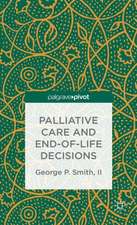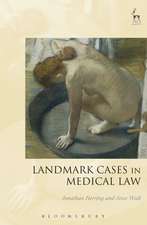Governing Public Health: EU Law, Regulation and Biopolitics: Modern Studies in European Law
Autor Mark L Flearen Limba Engleză Hardback – 29 iul 2015
| Toate formatele și edițiile | Preț | Express |
|---|---|---|
| Paperback (1) | 252.84 lei 6-8 săpt. | |
| Bloomsbury Publishing – 25 apr 2018 | 252.84 lei 6-8 săpt. | |
| Hardback (1) | 541.93 lei 3-5 săpt. | |
| Bloomsbury Publishing – 29 iul 2015 | 541.93 lei 3-5 săpt. |
Din seria Modern Studies in European Law
- 30%
 Preț: 575.75 lei
Preț: 575.75 lei - 24%
 Preț: 440.21 lei
Preț: 440.21 lei - 31%
 Preț: 594.77 lei
Preț: 594.77 lei - 30%
 Preț: 570.22 lei
Preț: 570.22 lei -
 Preț: 181.55 lei
Preț: 181.55 lei - 30%
 Preț: 507.97 lei
Preț: 507.97 lei - 30%
 Preț: 790.77 lei
Preț: 790.77 lei - 34%
 Preț: 509.45 lei
Preț: 509.45 lei - 30%
 Preț: 511.64 lei
Preț: 511.64 lei - 19%
 Preț: 296.91 lei
Preț: 296.91 lei - 30%
 Preț: 571.34 lei
Preț: 571.34 lei - 19%
 Preț: 296.72 lei
Preț: 296.72 lei - 11%
 Preț: 375.73 lei
Preț: 375.73 lei - 30%
 Preț: 539.57 lei
Preț: 539.57 lei - 30%
 Preț: 595.65 lei
Preț: 595.65 lei - 27%
 Preț: 475.10 lei
Preț: 475.10 lei - 30%
 Preț: 572.80 lei
Preț: 572.80 lei - 30%
 Preț: 721.14 lei
Preț: 721.14 lei - 18%
 Preț: 320.53 lei
Preț: 320.53 lei - 18%
 Preț: 321.66 lei
Preț: 321.66 lei - 30%
 Preț: 600.57 lei
Preț: 600.57 lei - 19%
 Preț: 317.21 lei
Preț: 317.21 lei - 30%
 Preț: 571.34 lei
Preț: 571.34 lei -
 Preț: 464.01 lei
Preț: 464.01 lei -
 Preț: 239.77 lei
Preț: 239.77 lei - 30%
 Preț: 538.03 lei
Preț: 538.03 lei - 23%
 Preț: 418.50 lei
Preț: 418.50 lei - 29%
 Preț: 587.97 lei
Preț: 587.97 lei - 30%
 Preț: 774.62 lei
Preț: 774.62 lei - 30%
 Preț: 570.43 lei
Preț: 570.43 lei - 30%
 Preț: 574.10 lei
Preț: 574.10 lei - 28%
 Preț: 495.80 lei
Preț: 495.80 lei - 30%
 Preț: 575.33 lei
Preț: 575.33 lei - 30%
 Preț: 571.24 lei
Preț: 571.24 lei - 30%
 Preț: 510.34 lei
Preț: 510.34 lei - 20%
 Preț: 219.19 lei
Preț: 219.19 lei - 30%
 Preț: 601.69 lei
Preț: 601.69 lei - 30%
 Preț: 513.60 lei
Preț: 513.60 lei - 18%
 Preț: 305.72 lei
Preț: 305.72 lei - 30%
 Preț: 972.83 lei
Preț: 972.83 lei - 30%
 Preț: 515.24 lei
Preț: 515.24 lei - 30%
 Preț: 539.99 lei
Preț: 539.99 lei - 30%
 Preț: 570.83 lei
Preț: 570.83 lei - 30%
 Preț: 571.82 lei
Preț: 571.82 lei - 29%
 Preț: 554.35 lei
Preț: 554.35 lei - 30%
 Preț: 572.06 lei
Preț: 572.06 lei - 13%
 Preț: 258.15 lei
Preț: 258.15 lei - 30%
 Preț: 574.59 lei
Preț: 574.59 lei
Preț: 541.93 lei
Preț vechi: 774.92 lei
-30% Nou
Puncte Express: 813
Preț estimativ în valută:
103.70€ • 108.27$ • 85.82£
103.70€ • 108.27$ • 85.82£
Carte disponibilă
Livrare economică 14-28 martie
Preluare comenzi: 021 569.72.76
Specificații
ISBN-13: 9781849462204
ISBN-10: 1849462208
Pagini: 324
Dimensiuni: 156 x 234 x 27 mm
Greutate: 0.63 kg
Editura: Bloomsbury Publishing
Colecția Hart Publishing
Seria Modern Studies in European Law
Locul publicării:London, United Kingdom
ISBN-10: 1849462208
Pagini: 324
Dimensiuni: 156 x 234 x 27 mm
Greutate: 0.63 kg
Editura: Bloomsbury Publishing
Colecția Hart Publishing
Seria Modern Studies in European Law
Locul publicării:London, United Kingdom
Caracteristici
Other topics explored in the book include; risk and security, human rights and bioethics, accountability and legitimacy, democracy and citizenship and the European integration project.
Notă biografică
Mark L Flear is a Lecturer in Law at Queen's University, Belfast.
Cuprins
1. Context, Approach and Overview I. Introduction II. Law, Public Health and Participation III. Governing in Late Modernity: Theory, Concepts and Methods IV. Overview Part I: Governing Public Health2. EU Public Health Governance: From the Overarching Architecture to the Health Strategy I. Introduction II. The EU and Public Health: Legal Competence, Governance and Responsibility III. Operationalising the Overarching Strategy in the Field of Public Health: Together for Health IV. Structured Cooperation: Public Health Policy Implementation and the Health Programmes V. Conclusion 3. Cancer I. Introduction II. From the Overarching Architecture of Governance to Action Against Cancer: European Partnership via Together for Health III. European Partnership for Action Against Cancer IV. Conclusion 4. HIV/AIDS I. Introduction II. From the Overarching Architecture of Governance to Combating HIV/AIDS within the EU and in the NeighbouringCountries - Reflecting Together for Health III. Taking Action: Combating HIV/AIDS within the EU and in the Neighbouring Countries IV. Technologies for the Gathering and Production of Knowledge V. Conclusion 5. Pandemics and Beyond I. Introduction II. From the Overarching Architecture of Governance to Pandemic Influenza Preparedness - ReflectingTogether for Health III. Governing the Future Through Preparedness Planning IV. Conclusion Part II: Enhancing Citizen Participation in Governing Public Health6. Citizen Participation in Governing: Discursive Resources,Tools and Spaces I. Introduction II. Summary of the Findings So Far III. Risk, Public Health and Citizen Participation IV. Opening Discursive Space and Powering Technologies of Participation V. Conclusion 7. Querying Framing and Knowledge Production: Risk, Numbers, Measurement and Evaluation I. Introduction II. Querying Risk III. Querying Scientific and Technical Knowledge Production IV. Clinical Trials V. Conclusion 8. Querying Interventions: Magic Bullet Responses and Technological Fixes I. Introduction II. Interventions III. Pharmaceuticals Abroad: Access, Prioritisation and Triage IV. Conclusion 9. Conclusion
Recenzii
Governing Public Health defies disciplinary boundaries; it brings together insights from sociology, political science, law and critical legal studies in order to uncover the complex regulation of public health in the European Union. It is a timely book which will appeal to scholars of the European Union in many disciplines. It provides an indispensable roadmap to the links between law, (bio)politics and citizen engagement in the regulation of public health.
Governing Public Health stands on its own, as it masterfully blends together law, politics, sociology and numerous other disciplines to come up with a picture of the EU as an agent of biopolitics, which is as plausible as it is potentially disturbing. The book is an attack on the distortions and pitfalls of the dominant risk-based model of public health governance, representing the first --- long overdue! --- biopolitical analysis of EU law. Flear's crusade is to overturn our accepted vision of managing public health by arguing that the governed have the capacity to contribute important supplementary knowledge on the distortion and pitfalls in order to improve governance. This book deserves all respect and admiration.
This book focusses on participation as a possible mediator of the relationship between law, one the one hand, and science and technology on the other. It argues that the tension between the democratic and technocratic aspects of regulation could, perhaps, be reduced by the use of participatory processes. That argument has a wider resonance than the public health field on which the book concentrates. EU scholars in the diverse fields where expertise and preferences circle each other nervously will want to study and apply the book's central ideas, and will find that they are clearly and attractively presented, and gain authority from the range of theory on which he relies.
Flear.has written a very fine.book in Governing Public Health.. [It] is a thoroughly well-researched and interdisciplinary book that produces insightful and positive prescriptions for improving governance and the relationship between the state/supranational union and its citizens. Flear is clearly passionate about increasing the substantive involvement of 'the governed' in governing so that their needs, however so defined, are better met and respected.Governing Public Health merits reading and deep deliberation by all scholars interested in law and public health (including outside the EU) and the vital roles of the citizen in modern governance and democracy.
This is an interdisciplinary book which may appeal to scholars of a variety of disciplines. It provides a guide to find a link between law, politics and citizen engagement in public health regulation. (Translated from the original Italian)
There is much in this book which will be of significant interest to those who seek to develop an understanding of the engagement of EU law with public health.. [This] book is likely to serve as a stimulus for future research.on the relation between 'the governed' and the governance of public health by the EU. Understood in those terms, this is a scholarly and highly valuable analysis that provides much food for thought about the nature and limitations of governance in late modernity, and as such it is likely to find an appreciative readership both within EU studies and well beyond.
Governing Public Health stands on its own, as it masterfully blends together law, politics, sociology and numerous other disciplines to come up with a picture of the EU as an agent of biopolitics, which is as plausible as it is potentially disturbing. The book is an attack on the distortions and pitfalls of the dominant risk-based model of public health governance, representing the first --- long overdue! --- biopolitical analysis of EU law. Flear's crusade is to overturn our accepted vision of managing public health by arguing that the governed have the capacity to contribute important supplementary knowledge on the distortion and pitfalls in order to improve governance. This book deserves all respect and admiration.
This book focusses on participation as a possible mediator of the relationship between law, one the one hand, and science and technology on the other. It argues that the tension between the democratic and technocratic aspects of regulation could, perhaps, be reduced by the use of participatory processes. That argument has a wider resonance than the public health field on which the book concentrates. EU scholars in the diverse fields where expertise and preferences circle each other nervously will want to study and apply the book's central ideas, and will find that they are clearly and attractively presented, and gain authority from the range of theory on which he relies.
Flear.has written a very fine.book in Governing Public Health.. [It] is a thoroughly well-researched and interdisciplinary book that produces insightful and positive prescriptions for improving governance and the relationship between the state/supranational union and its citizens. Flear is clearly passionate about increasing the substantive involvement of 'the governed' in governing so that their needs, however so defined, are better met and respected.Governing Public Health merits reading and deep deliberation by all scholars interested in law and public health (including outside the EU) and the vital roles of the citizen in modern governance and democracy.
This is an interdisciplinary book which may appeal to scholars of a variety of disciplines. It provides a guide to find a link between law, politics and citizen engagement in public health regulation. (Translated from the original Italian)
There is much in this book which will be of significant interest to those who seek to develop an understanding of the engagement of EU law with public health.. [This] book is likely to serve as a stimulus for future research.on the relation between 'the governed' and the governance of public health by the EU. Understood in those terms, this is a scholarly and highly valuable analysis that provides much food for thought about the nature and limitations of governance in late modernity, and as such it is likely to find an appreciative readership both within EU studies and well beyond.


















